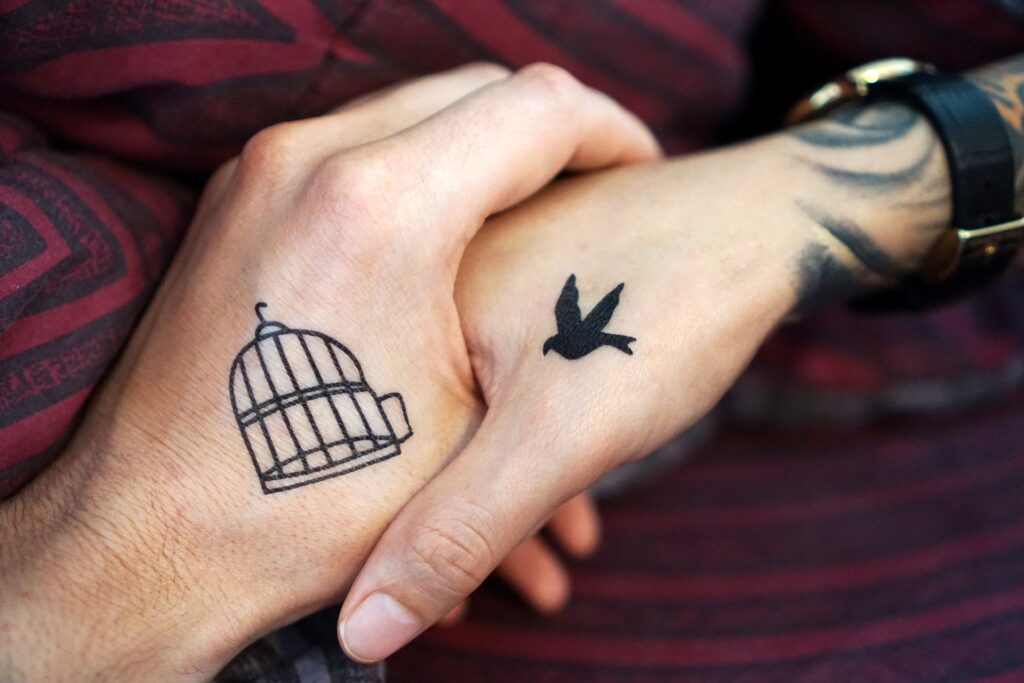Compassion Fatigue (also known as emotional burnout) is emotional and physical exhaustion that occurs over time. It’s the gradual depletion of your energy, that results in you running on empty and beginning to show up in your life in a way that reflects this.
We are especially prone to this if we have a high level of empathy.
There is an innate quality in us that wants to help people, in our day to day lives, our families and friendships and often in our work too.
Compassion Fatigue is gradual, and we often don’t notice it until we hit our breaking point.
By that time its changed who we are, and we begin behaving in ways that are not lined up with our true self.
Let’s start by looking at some examples of situations of how Compassion Fatigue can occur.

Supporting a Friend
You’ve probably had friends that have been through challenges.
And you’re a good friend, so you show up and support them.
You make yourself available and you hold space, you find the time and energy to plug in on the phone, in person and you respond to their texts telling them that they’re worth so much more and they’ve got this!
As the outsider on the situation you can be way more objective, and you give good, solid advice.
Your friend will hopefully get through the challenge that life brought to their door, they will regroup and recover and need this higher level of support less as time moves on.
Your job will be done and life will go on.
There are however people that won’t recover quickly and need a different kind of support to the kind that you can offer, and as a good friend you may have to suggest that they seek it in the way of a counsellor, a coach, a doctor, lawyer or another type of specialist. Knowing who you can help and how you can help them along with your own limitations is an act of self care and love for your friend too, a graceful side step in order to allow them to access who or what they need doesn’t mean that you are bailing out but it does mean that you know they need something that you can’t give.
Then there is the friend that is struggling, but is not prepared to change.
And you may not know this until you are heavily embroiled in trying to help them.
Initially they seem as if they are going to take action in a positive direction to either heal their situation, or change it.
But they don’t.
That’s ok – it’s a process, and you’re such a good friend that you keep going.
You invest more time and energy, knowing that any day now they will have the combination of strength and epiphany that helps them to break the cycle.
But they don’t.
After a few months of this you start to feel ticked off.
They just aren’t listening to you, they won’t take advice and they are so stuck in their stuff that your input is making little to no difference to them – but it is to YOU.
The emotional and energetic cost to you is mounting.
And you start to dump their calls.
You don’t respond to texts straight away.
When they try to come over your heart sinks and you find yourself making excuses.
Its not that you don’t care, its just that you’ve given all you can.
You find that you no longer have the empathy and compassion that you started out with, and you may begin to become quite cynical about them and their lack of progress.
They have become a bit if an Askhole and you’re going to have to disconnect.
Your relationship with them makes you feel so emotionally depleted that you have to protect your own energy and to reduce your frustration.
You’ve given them the best advice that you could and held space for them, invested your time and energy and that’s disappeared down the black hole of inaction.

In Your Work
Those of us in helping professions where we support other people are especially prone to Compassion Fatigue. Coaches, healers, therapists, the medical profession and teachers are just a few examples and there are many more. Any profession where you are being exposed to the pain, suffering and challenges of other people on an ongoing basis is going to leave you vulnerable to emotional burnout.
Compassion Fatigue can also occur in the work place when someone that you have regular contact with as a colleague is struggling in their life with a challenge and they share this with you on a day to day basis. They may not be a friend as such, but the experience for you may be similar to supporting a friend if they lean on you for emotional and energetic support regularly and you will likely end up feeling depleted and resentful as we’ve already discussed.
Because we are human, when we experience this depletion at work we cannot switch it off when we get home. We walk through the door into our family environment with nothing to give.
This affects marriages, relationships with our children, our health and more.
The people that we want to be present for and connect with end up getting the version of us that is running on empty and cannot have any meaningful engagement – ironic indeed as we go to work to provide what our family needs because we love them, yet sometimes the energetic and emotional cost of our work is so great that we damage the very people and relationships that we are working for in the first place.

In a Family
A house, community or group can all become overly invested in the trauma or challenge of one individual and become depleted and emotionally burned out as a result.
A good example of this would be a family that are supporting one family member with a physical health issue that has been chronic and intractable, and has now triggered secondary issues such as depression, being socially withdrawn and a generally negative outlook on life.
The journey begins with buckets full of compassion and understanding, empathy and input.
Nothing is too much trouble and the person that needs the care and attention gets what they need and often more.
But the weight of the situation and the ongoing feeling of no light at the end of the tunnel starts to crush the people that are helping. Guilt might set in alongside resentment, as they start to feel bad for being grouchy and wishing for a different life.
The helpers start to feel beat down and this translates into the relationships they have with each other, their friends and relationships outside of the home.
And then one day they reach the tipping point and what started out as being devoted to someone they love, ends in a fuck it moment where they lose their temper or breakdown.
This is because they have nothing left to give.
Energy Thieves
Energy is something that we get a bucketful of every day.
And every day we get to choose how we spend that energy.
Some of it is going to have to be allocated to tasks such as getting up and showered, grocery shopping, the school run and work.
These kind of energy spends may not be optional in your life (although you may be able to reduce the energy spend by doing a car pool for the school run, shopping on line and getting a cleaner.)
But there are other kinds of energy spend that ARE optional.
The word “spend” is a great one to use with regard to your energy, because it brings you back to the fact that your energy is a precious resource and that this is a choice.
Once you have spent your energy for the day, you are going to be running on empty.
And after that you are going to be into your overdraft which is where health problems and more can occur because the body needs energy too.
Once we are at our limit with those in our lives that have depleted us, its easy to throw blame in their direction, and believe that you feeling so wrung out is their fault.
But wait a minute – didn’t you allow it?
If you ARE feeling depleted and wrung out your ego might bounce right back with “I had no choice.”
And in some cases that might be absolutely true.
If you have no resources or support at all and you are the only person that can support another person with something huge in their life, and the consequences will be beyond dire if you don’t, then you had no choice.
I would say however, that this is unlikely.
Because we are big hearted empathic types, we want to help other people.
And when we get depleted and have to pull back we feel bad and then this drags our energy down even more.
But here’s the thing – what else and who else could have supported that person?
Is there a phone line that they could use in the middle of the night with trained professionals that would talk them through suicidal thoughts instead of you being woken up night after night and having to make the call to emergency services on their behalf?
Is there a friend, relative, colleague or neighbour that could help?
Are there services that could take some of the physical strain for the chronically depressed friend who has let their house go, instead of you going around every weekend and cleaning it from top to bottom?
Does their place of work offer employee assistance such as counselling?
Can the doctor or other healthcare professional help?
Who or what else could take some of this for you and reduce your energy spend?
Sometimes we are the collaborators with those that steal our energy.
By over investing and giving energy away that we really needed for ourselves, we allow them to steal from us, and then we target our resentment and blame in their direction and feel bad for it because we aren’t a mean person. This perpetuates the depletion and takes us further into that state of Compassion Fatigue.

Might you be Suffering?
Self-Awareness & Warning Signs
The first step is to be aware.
Know your own limitations and your own warning signs that you are approaching the edge, and that emotional burnout may be beckoning.
We all have a different tolerance level to energy depletion, some of us are more resilient than others. This tolerance can also fluctuate at different times in our lives and can be reduced by our own personal circumstances.
Interestingly those that have had past trauma in their lives (and especially unresolved trauma) have a lower tolerance for emotional burnout or compassion fatigue.
In other words they have lesser reserves of energy and get depleted faster.
Knowing your own warning signs is vital to being able to help yourself.
Reflect on how you feel and what your body does when you are feeling depleted.
For me its eczema on my scalp, feeling brain foggy and low in energy and often lower back pain.
You may be prone to acne, cold sores, irritable bowel, fatigue, eye twitch or anything else.
Once you know that you are heading towards the danger zone, or the end of your tolerance you need to get some strategy in place.
The other thing to reflect on is your behaviour.
How does this change when you are feeling wrung out?
Do you have trouble sleeping?
Do you drink more alcohol and crave sugar?
Do you use video games or social media to zone out and disconnect from those around you?
Do healthy habits slip and unhealthy ones start up?
Again, these are signs that you are depleted.

What to do
- Boundaries
Get some and reinforce the ones you’ve got already.
You don’t have to answer every phone call or text message immediately.
Get some distance and start to side step what you can. - Self Care
Ramp it right up.
What is it YOU need to fill your own cup up?
What makes you feel relaxed and happy?
Do more of that and less of what doesn’t.
This will start to shore your energy up.
No its not selfish either – if you don’t do this you are going to sink.
Meditation, Yoga and Mindfulness have all been shown to help increase your emotional resilience and to help you return back to a healthy baseline faster if you are exposed to compassion fatigue / emotional burnout / trauma / secondary trauma. - Get help when you need it.
Do you need some help and support?
What would that look like?
What action do you need to take? - Delegate
What can you delegate in your own life so that you can hold onto some energy? - Stop taking on too much
Learn to say no as your new default.
If you are so depleted that you can’t say no because its just easier to say yes, then try the breathing space technique instead.
When someone asks you to do something, tell them that you’re not sure right now if that will fit but you’ll get back to them.
When you are not face to face with them and you have time to review their request, ask yourself “is this in my highest good right now.”
And if the answer is no, then say so – but from a safe space where you are not infront of that person and you feel pressured into a yes that you don’t mean. - Basic Energy Clearing & Grounding
Everything is energy, and learning to cut cords, disconnect and clear your energy is so important, especially when you are supporting other people that are lower vibration that yourself. - Empower people to help themselves
You can’t fix or save anyone.
We are the only people that can do this for ourselves, and that goes for each and every one of us. Do what you can to encourage people to stand on their own two feet and make progress in their lives, a good one to have up your sleeve is that they might some professional input from a counsellor or coach that is removed from the situation and can be objective. This is especially good to bring up after you’ve tried several times and you can legitimately say that you are clearly not helping them to move forwards. - Support from the side lines where possible
This isn’t always possible, but when it is take a step back.
Being a good friend to someone means being a good friend to yourself first.
You can be there for someone without sacrificing yourself. - Stop jumping in to save everyone
You are not responsible for everyone’s happiness.
People have other people and services and resources around them apart from you.
Rein in your natural instinct to be all things to all people.
Sometimes we have to let others find their own way in order to help their soul to grow and evolve, and allowing this is a great act of love for you both.
In conclusion, I feel that the greatest way to reduce the effects of Compassion Fatigue is to have compassion for yourself first. Stop putting everyone else’s needs above your own and know that you are a precious soul as well and you deserve to experience joy, happiness, love, health and well being.
Support others, but do so in a way that does not represent a cost to you that will be detrimental.
Don’t allow yourself to give away what you need for you, ever.

Have you checked out my Membership Option?
<< Life & Soul Academy >>
The ultimate place for personal and spiritual development, conscious community, healing and creating a life that you love. Get access to my Life & Soul Library full of workshops, guided meditations and energy sessions to stream or download to your device, new content added every month!
Related Posts
The Pay Off of Drama & How to Disconnect
Signs That You Are An Empath & How to Cope
Stop Saying Yes When You Mean NO!
How Are You Spending Your Energy?
Are You TRAPPED In The Life You Thought You’d Love?
Free Resources to Help You —-> << Click Here >>
Please share onto your social media so we can help more people.
Let me know if this is you in the comments section.


Loved this blog kate as much as I have learnt being in KSA I still need a nudge a reminder of self care and boundaries thank you for being there and sign posting us back to base wonderful 💜
I love it that you loved it! x
Oh Kate,
You are so right. I am so glad our paths connected. I especially love the section on friends who become Askhokes. I laughed the entire time I read it because it is so me. Lots of Love. xx
I love it that it made you laugh as well as being useful! x
Excellent informative blog as always Kate. Thank you . xxx
So glad to be of service! x